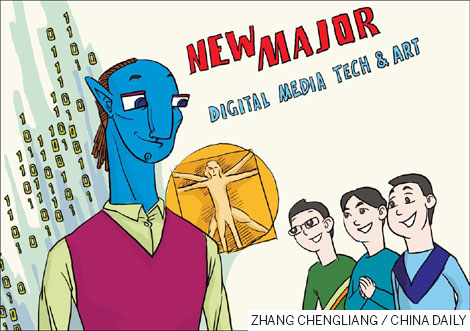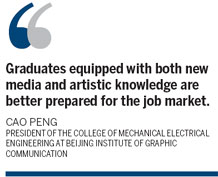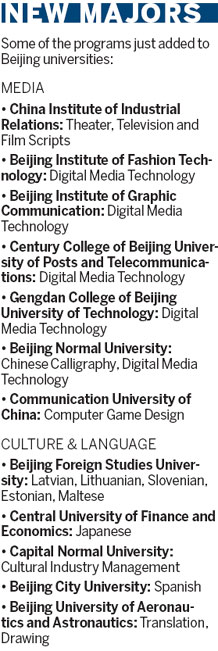
|
 |
Computer art, digital media all the rage among college students
Liu Xuan considers himself a very lucky collegian. He studies what he plays.
"I have been a fan of computer games since I was a little boy," said the 19-year-old freshman at the Beijing Institute of Graphic Communication (BIGC).
"I want to become a computer game programmer. It requires a command of techniques and an appreciation for art."
As one of the students enrolled in the newly added major of digital media technology and art, he taking one step closer - with video game controller in hand - to his dream.

As digital media continues to gain popularity, five universities in Beijing have established a new major in digital media technology to meet the rising market demand. The Ministry of Education has ratified the new major.
Cao Peng, president of the College of Mechanical Electrical Engineering at the BIGC, told METRO the major was approved last year because workers with expertise in both traditional media as well as animation, web design and digital art are in huge demand.
"Digital media is like the movie Avatar - the mix of technology and art," Cao added. "Art which used to be neglected is an important element of digital communication. Animation and arts have been introduced to the new major to meet people's increasing appreciation level."
BIGC now has 36 students in the major, which offers a curriculum rich in such subjects as
information automation, C language programming, animation and design.

"We are going to double the size of the class next year," Cao said. "About 300 students will be enrolled annually."
He's very optimistic about the employment prospects for graduates in the major.
"The media industry is in an unprecedented transition from print media to digital media," he said. "Graduates equipped with both new media and artistic knowledge are better prepared for the job market."
He said students in the digital media major are eligible for jobs in numerous social and business sectors, including digital publications, advertising, web portals and websites and conference exhibitions.
Other Beijing universities to start the major are Beijing Normal University, the Beijing Institute of Fashion Technology, Century College of Beijing University of Posts and Telecommunications, and the Beijing University of Technology.
Liu is among the students and employers applauding the universities' willingness to embrace digital media. "The major covers a wide range of subjects from web design to computer science," he said. "It makes me qualified for many positions in the gloomy job market."
Zhao Dan, who is in charge of recruitment at a computer game company, said people who understand programming and have a good sense of art are prized assets.
"The computer games industry is developing very swiftly, but not many candidates are up to our requirements," she said.
Other universities have adjusted curriculums to satisfy the ever-changing job market in other areas, too. Beijing's 29 universities established or altered 54 majors, according to the Ministry of Education. Across China, colleges have set up and adjusted 1,733 majors with a bachelor's degree and seven majors with a medical professional training degree in 2009.
Peking University added four new majors - aerospace engineering; English for biology and medicine; the study of politics, economics and philosophy; and energy and resources engineering. Tsinghua University launched three new majors.
Beijing Foreign Studies University started six new majors, the most among all universities. They are all foreign minority languages: Latvian, Lithuanian, Slovenian, Estonian and Maltese and Hibernian.
Liu brims with confidence over what he has learned over the past semester.
"It is amazing how modern technology can make art even more fascinating," he said of his favorite subject -computer drawing. "I enjoy the process of learning this modern magic."